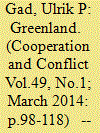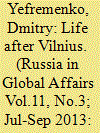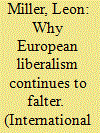|
|
|
Sort Order |
|
|
|
Items / Page
|
|
|
|
|
|
|
| Srl | Item |
| 1 |
ID:
129443


|
|
|
|
|
| Publication |
2014.
|
| Summary/Abstract |
The relationship between Greenland and the European Union (EU) can best be understood by exploring the development from Danish colonialism to a future independent Greenlandic state. In 1985, Greenland became the first territory ever to leave the European Economic Community (EEC) when it opted for status as an 'overseas country or territory'. The manner in which Greenland had to follow Denmark into the EEC in 1973 - whereby Greenlanders saw control over their fisheries move from distant Copenhagen to even-more-distant Brussels - was pivotal for the Greenlandic demands for home rule that succeeded in 1979 and made the 1985 withdrawal possible. On 25 November 2008, a majority of the people of Greenland voted in favour of enhanced home rule - 'self-government' - still within formal Danish sovereignty. Denmark and Greenland alike are preparing for a future envisioned as involving climate change, intensive raw material extraction, new transportation corridors and new claims to sovereignty over the Arctic. Greenland uses this imagined future as a way of enhancing its subjectivity, not the least when dealing with the EU. This article analyses how the Greenlandic self-understanding as being on the way to sovereignty - and the tensions involved - structures the triangular relationship between the EU, Greenland and Denmark. The article concludes that the visions of sovereign equality might, on the one hand, create greater expectations than Greenland will immediately be able to live up to - at home and in the EU. On the other hand, the representation of the Greenland-EU relationship as one of sovereign equality - present and future - might just be able to provoke the resources necessary to make the dream come true.
|
|
|
|
|
|
|
|
|
|
|
|
|
|
|
|
| 2 |
ID:
127047


|
|
|
|
|
| Publication |
2013.
|
| Summary/Abstract |
This article presents some of the results of a project conducted as part of a Russian Academy of Sciences program: "Perspectives of Coordinated Social and Economic Development of Russia and Ukraine in the Pan-European Context."
A political anniversary passed largely unnoticed on 12 September 2013: fifty years ago on that date Turkey and the European Economic Community signed an association agreement. Although it might be a good time to look back on what has been achieved since then and make plans for the future, Turkish politicians have largely ignored the anniversary. And for good reason! While the association agreement resulted in tangible economic benefits for Turkey, in the political sense it doomed that ambitious country to 50 years of humiliating uncertainty in the antechamber of a unifying Europe. Today Ukraine, another large country, is impatiently waiting to be let into that antechamber. But no political analyst in his right mind will state that Ukraine will not have to wait longer than Turkey for full-fledged European Union membership.
|
|
|
|
|
|
|
|
|
|
|
|
|
|
|
|
| 3 |
ID:
126674


|
|
|
|
|
| Publication |
2013.
|
| Summary/Abstract |
In response to a widespread idea of the European Union as a "peace project," an idea disseminated especially after the EU received the 2012 Nobel Peace Prize, this essay retrieves some of the historical causes of the foundation of the European Economic Community (EEC) in 1957. The essay emphasizes specific geopolitical and colonial incentives that had lain behind the European integration project ever since the pan-European blueprints the interwar period and which became critical with the Suez crisis and decolonization movements of the 1950s. As the essay demonstrates, practically all of the visions, movements, and concrete institutional arrangements working toward European integration during this period placed Africa's incorporation into the European enterprise as a central objective. As much of the scholarly, political, and journalistic accounts at the time testify, European integration was inextricably bound up with a Eurafrican project. According to the intellectual, political, and institutional discourse on Eurafrica, a future European community presupposed the transformation of the strictly national colonial projects into a joint European colonization of Africa. Strong evidence suggests that these ideas were instrumental in the actual diplomatic and political constitution of the EEC, or of Europe as a political subject, in 1957. The essay discusses why the EU's colonial origins have been consigned to oblivion in mainstream research and why this history is of continued concern to the world.
|
|
|
|
|
|
|
|
|
|
|
|
|
|
|
|
| 4 |
ID:
131016


|
|
|
|
|
| Publication |
2014.
|
| Summary/Abstract |
With tl1e failed attempt to institute Liberalism in the aftermath of WWI it seemed the idealistic vision of perpetual peace, increased prosperity, and collective security was merely an unrealistic hope. However, the successful progression of the European Union from the European Coal and Steel Community and the European Economic Community began a new era of interstate relations. But, the repeated refusal of states to ratify the European constitution is a sign that European economic and policy integration is not enough to give Europeans a sense of shared values and principles and a sense of common heritage. The dissatisfaction over Europe's recent ?nancial woes--that were described as threatening a break-up of EU-has indicated that European Liberalism is faltering again. This article analyzes the issue from the perspective of peace research, global political economy, social psychology, and intercultural relations.
|
|
|
|
|
|
|
|
|
|
|
|
|
|
|
|
|
|
|
|
|